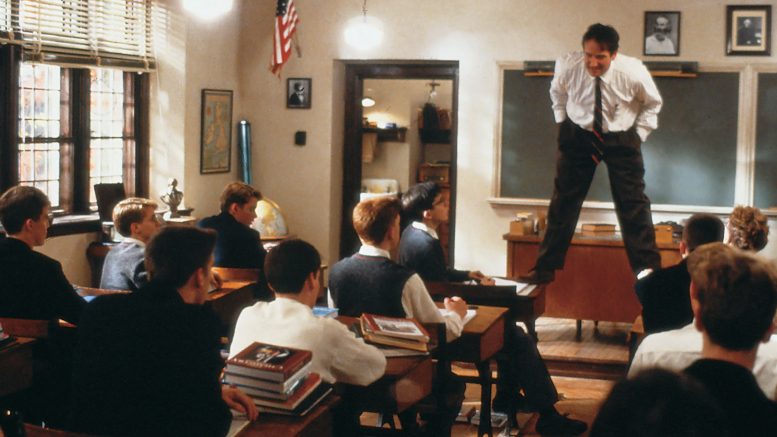Thirty-six years after its release, I recently had the opportunity to watch one of the cult classic back-to-school films, Dead Poets Society. Although filmed more than three decades ago, this story of a gang of awkward-yet-driven New England schoolboys and their eccentric English teacher continues to provide insight on how to make the most of our time as students.
In the movie, shy Todd Anderson is enrolled in a posh boarding school where schoolboys are governed by rigid time schedules and traditionalist, near-authoritarian teachers. Todd quickly becomes close friends with his roommate Neil Perry and a crew of other students, who are all in Mr. Keating’s English class.
To the students’ surprise, Keating instructs them to do bizarre tasks, from standing atop desks to marching in the school’s courtyard to teach them important life lessons. The boys, feeling inspired, take the lessons to heart and seize the day in their own ways, though not without consequences.
Many of us at U of M may find it difficult to relate to the White Anglo-Saxon Protestant characters and the repressive preparatory school setting in Dead Poets Society. However, as I approach the end of my undergraduate degree, I cannot help but reflect on my time in university in connection with the film.
Thinking outside the box
Keating teaches his students to think differently and to let go of stifling conventions that do not serve them. In one scene, he asks his students to rip out a chapter from a textbook that reductively suggests a poem can be evaluated based on its “perfection” and “importance.”
University should be a place for innovation and academic freedom, so the film teaches us not be afraid to use the lessons we have been taught in unorthodox ways, or even disregard them sometimes. It might be helpful to still learn the rules first, however. As the saying goes, ‘learn the rules like a pro, so you can break them like an artist.’
The power of the humanities
In the film, Keating says, “medicine, law, business, engineering, these are noble pursuits and necessary to sustain life. But poetry, beauty, romance, love, these are what we stay alive for.” Keating’s passion for poetry shows the boys how art can be used to express oneself and challenge oppressive power structures.
In an era of capitalism where profitability is prioritized above all, ambitions in the humanities can often be overlooked as trivial pursuits or unwise career choices. Not everyone can pursue literature, theatre or music as careers, but perhaps use one of your electives to take a humanities class you are interested in — you might be surprised by what you can get out of it.
Friendship
This is a theme that has been repeated ad nauseam in popular media, but Dead Poets Society excels in depicting the close bonds between the boys. They constantly tease each other with playful banter, but they also care deeply for each other when tragedy strikes.
I have met more people during my degree than I ever had in the previous years of my life. Some will stay, many will go, a few may remain in my life for years to come, but the impact of these connections made in university will last my whole life.
Carpe Diem
Most importantly, Mr. Keating urges his students to seize the day, be daring and to live without regret, within reason.
Think about why you first started university. How can you make the most out of your time here in this fleeting, formative part of your life? In essence, what would it mean for you right now to truly seize the day?


